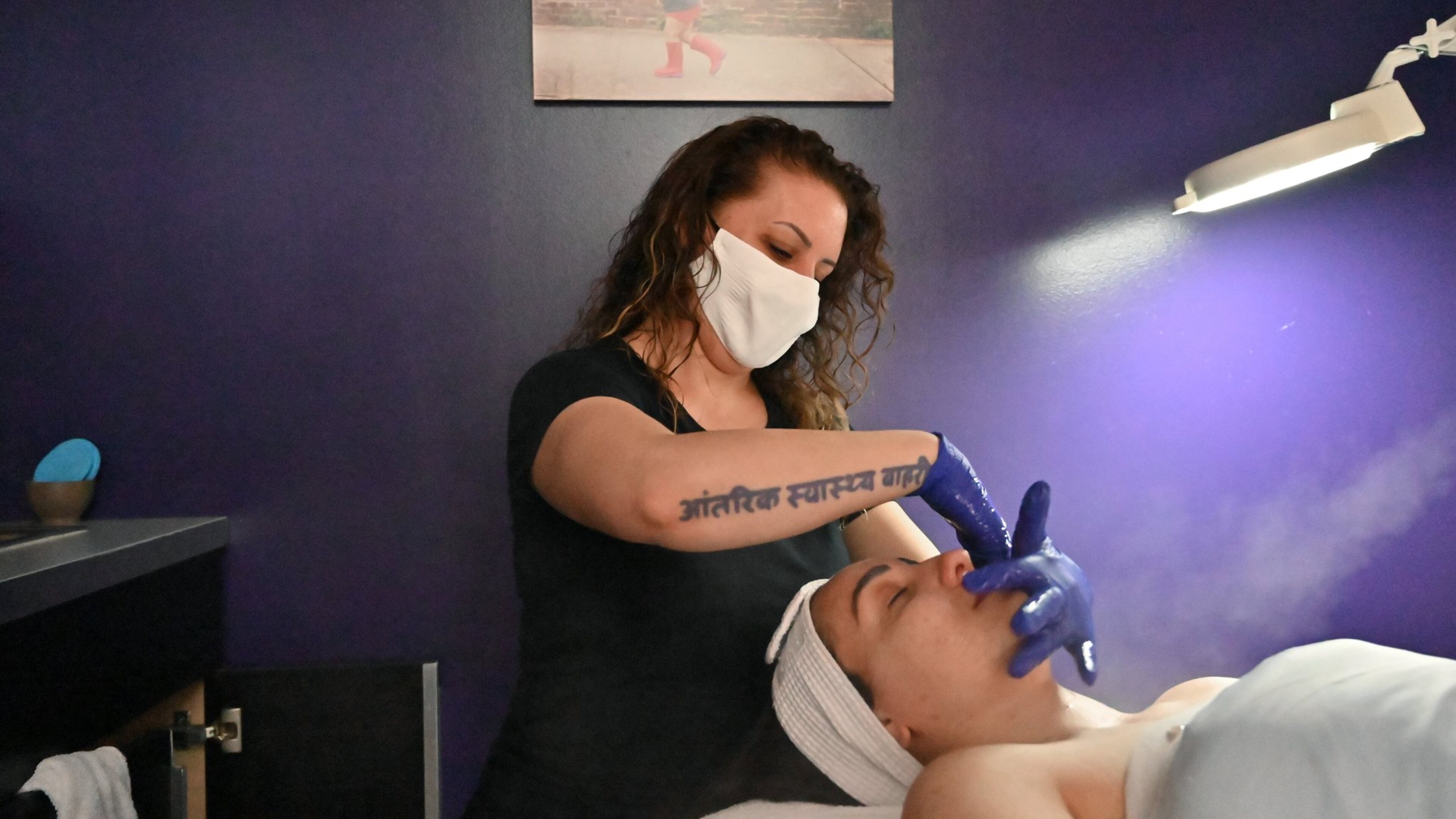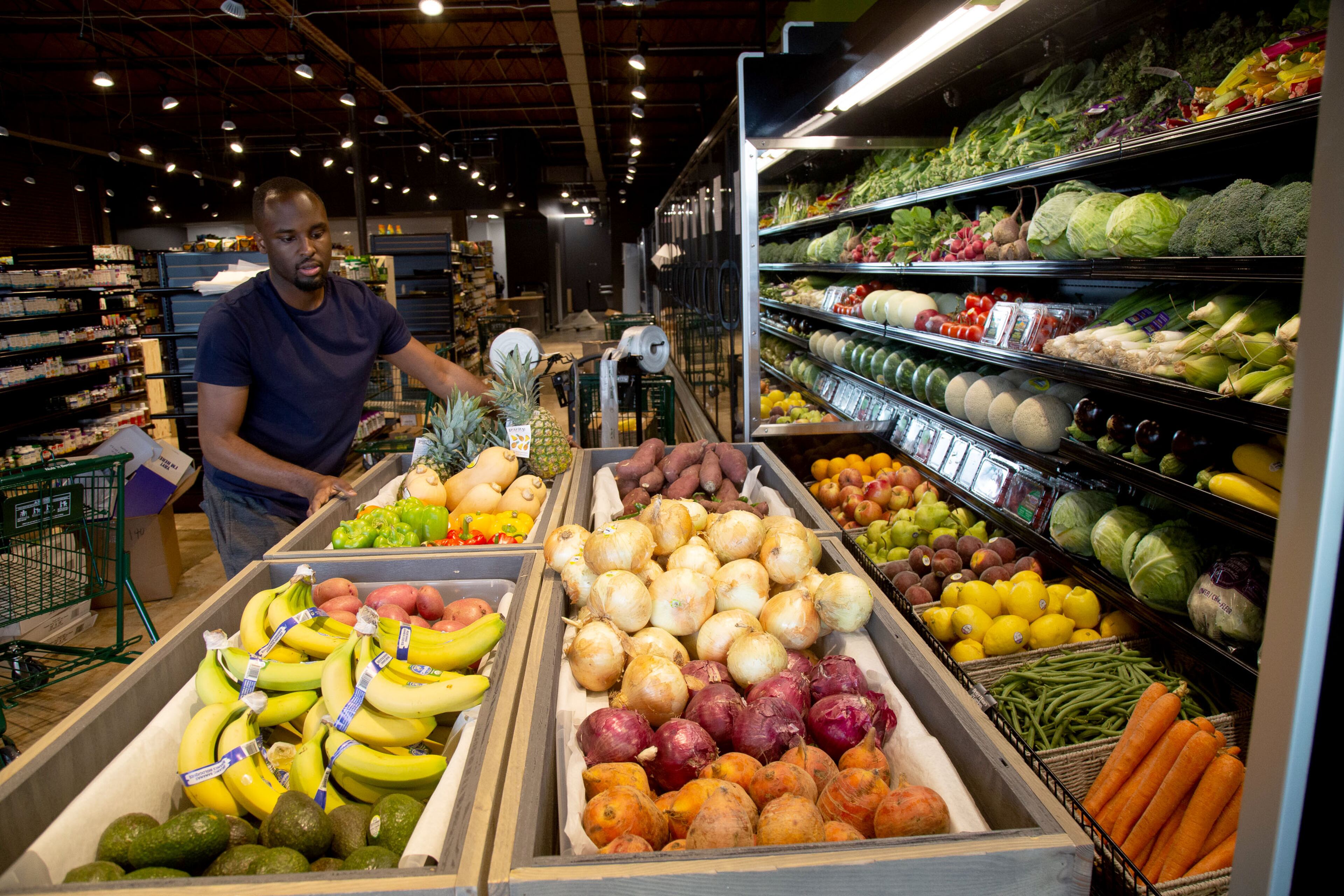Month after lockdown end, Georgia’s economy still reopening slowly

Facials, waxes, nail and skin care – it’s hard to get much closer to a customer than Paris Campeau gets to clients at her boutique spa.
But after two months of the coronavirus-triggered shutdown, Indigo Wellness in Kirkwood is reopening. Campeau welcomed a few clients this past week, and on Monday she's bringing back four of her 11 employees.
The spa also has new rules for masks, contact-less payments, mandatory appointments and scarce refreshments. All aimed at keeping workers and customers safe because the coronavirus hasn’t gone away.
Still a long way from business as usual.
"Let's see how it goes," Campeau said.
Indigo is emblematic of the Georgia economy one month after Gov. Brian Kemp ended shelter-in-place orders and allowed almost all businesses to reopen if they followed safety guidelines: Optimistic and opening up, but bearing added costs with a leaner staff and fewer customers. And plenty of unanswered questions.
If the first few weeks are a guide, there is motion in the right direction, but the route back to normality will be bumpy and slow.
By several key measurements — businesses reopening, consumer spending and mobility — the economy is slowly rising from the depths of April. But it is still far below pre-pandemic levels.
The biggest unknowns in the coming weeks and months are the course of the coronavirus – and the reaction of Georgians.
Consumer spending in mid-April was down 33% from January in Georgia, according to the Opportunity Insights Economic Tracker at Harvard University. Recent data shows spending recovering, but still down 15%.

Surging joblessness chills spending
More Georgians are venturing out but circulating — and spending — warily. Not only do they fear getting sick, but they fear losing their jobs.
Many already have lost their jobs — more than a million workers have filed unemployment claims in the state since mid-March. A federal emergency package approved in late March aims to help with weekly $600 supplements to unemployed workers through July. But many are still waiting for state and federal payments amid the continuing flood of applications.
Michelle Edwards of Buford lost her job as an executive assistant at a technology company. She filed an application for jobless benefits in mid-April and has been waiting since.
“How long can I go without being paid? I am there now,” she said. “I have a mortgage, I have a car payment, I have bills like a normal American. And I have a son about to go off to college.”
Customers at one business are employees at another. If they are laid off or even worried about losing their paychecks, they spend less, which hurts other businesses and can lead those companies to lay off their own employees.
More than 70% of American workers surveyed are worried about making ends meet, according to PeopleReady, a national staffing company.
Unlike previous, less drastic downturns, there is no structural obstacle to recovery, no overhang of debt or unsold housing that paralyzes consumers, said Raphael Bostic, president of the Federal Reserve Bank of Atlanta, in a teleconference Wednesday.
"There wasn't any excessive risk-taking," Bostic said. "And usually, when we have a hurricane it hits one market. This is like a national hurricane."
But after a natural disaster, businesses and workers can look to the future with hope, said John Johnson, chief executive of Edgeworth Economics, which specializes in labor markets. "This is very different. There's a fear factor."

Businesses reopen — and cross fingers
In a positive sign, more businesses are opening.
The governor's orders still prohibited the opening of bars, nightclubs, theaters, concerts and amusement parks in May. On Thursday, he lifted restrictions further, permitting larger gatherings and allowing bars and nightclubs to reopen Monday if they follow safety guidelines. Amusement parks can follow on June 12.
Among those already freed – even while still required to use social distancing – the number of open salons and retail stores in metro Atlanta is up more than 20% from the lows of April, according to Womply, which collects commercial data.
But even such robust-sounding growth is only a partial undoing of the damage.
One of every four restaurants is still closed. "This could be a signal that owners are having a hard time figuring out how to reopen while adhering to social distancing guidelines, are open but aren't seeing patrons, or may be closed permanently," said Dallin Hatch, a Womply director.
The biggest jump in Georgia spending since the lockdown has been in clothes, according to Fivestars, which tracks transactions on its software. Spending on apparel was up 25% for the week ending Memorial Day from the week before, but it's still 36% lower than a year ago.

While the shelter-at-home spurred online spending, a crucial measure of consumer engagement is mobility: the economy cannot truly rebound until Georgians feel free to move, to offices and stores and friends.
The past several weeks have seen a growing number of people on the roads, according to cell phone data collected by Cuebiq. Back in January, an average of 24% of metro Atlanta residents stayed home each day or, if they went out, didn't go more than a mile. That more than doubled to 49% at the quarantine's peak.
More recently, 35% were staying put, lower than April but still higher than normal, Cuebiq said.
Another sign of the halting recovery: public transit use nationally fell between 55% and 80% and has only edged up modestly, according to data from Moovit, which tracks public systems.
Manufacturers show progress despite trade hit
Concern about the virus – and efforts to slow the spread – have touched all corners of the economy, though some are bruised worse than others.
Trade has been rattled, which hurts the state’s ports, crucial conduits for both Georgia-made and Georgia-consumed goods that support hundreds of thousands of jobs.
Shipments were down 7% in April and have fallen as much as 15% in May, said Griff Lynch, executive director of the Georgia Ports Authority, speaking Wednesday to the Council for Quality Growth.
It will likely be a year before volumes return to pre-pandemic levels, he said.
Gaps in shipments have been a problem for some factories, forced to slow production or shut down for lack of foreign parts.
But the lion's share of manufacturing – which accounts for about 400,000 jobs in the state – has resumed production, according to Jason Moss, chief executive of the Georgia Manufacturing Alliance, an industry group.
“Some manufacturers are a little tentative – the larger the company, the more conservative they are,” Moss said. “But I think we are at 80% or 85%, and the rest are making plans to come back. Unless we have completely full hospitals in two weeks, I think Georgia will be heading forward on full steam.”

Small businesses hanging in balance
Nearly half of Georgians work for small businesses – and half of U.S. small businesses have less than 15 days of a cash cushion, according to JPMorgan Chase & Co. Institute. So with rent, utilities and loan payments piling up, even reluctant businesses have been under pressure to reopen.
"This could go one of two ways," said Sandra Lewis, co-owner of Sips n Strokes, a three-location art studio. "We could sell out. Or we could get a backlash from people saying it's too early to be opening."
A full house will also not be what it was: the studio will limit classes to 20 people, less than one-third of previous capacity, she said.
The studio plans to open Friday nights and Saturdays starting this weekend. It is asking participants to wear masks and maintain social distance. "We are still nervous about it, but at some point, you have to open," Lewis said.

If consumers come out to spend, there will be more hiring.
The Atlanta Fed estimated that for every 10 jobs lost during the pandemic, there have been three jobs added – many of them in delivery services, warehouses, big box stores and grocery markets.
That’s why a number of big markets have hung out the ‘Help Wanted’ signs, and why some smaller outfits are growing, too. Brookhaven-based health food retailer Nuts ‘n Berries on Monday will open a second location in Decatur, adding 24 employees.
Many economists think it will take more than the lifting of government restrictions for consumers to wholeheartedly embrace normality.
“In the 1918 pandemic, a lot of people chose to stay shut-in even after things opened up,” said Gerald Cohen, an author of the Wolters Kluwer Blue Chip Economic Indicators. “My view is, it’s not going to get worse, but we are going to have a slow recovery.”
Consumer spending in Georgia compared to January
Total: -15%
Healthcare: -36%
Entertainment: -64%
Restaurants: -45%
Transportation: -67%.
Apparel: -26%
Groceries: +19%
Source: Opportunity Insights Economic Tracker, Harvard University
Metro Atlantans staying within a mile of home each day
Mid-January: 24%
Mid-April: 49%
End of May: 35%
Source: Cuebiq
Share of metro Atlanta businesses closed by sector, May 21
Beauty, health: 27%
Lodging: 14%
Restaurants: 27%
Retail and wholesale: 9%
Sports and recreation: 29%
Source: Womply



